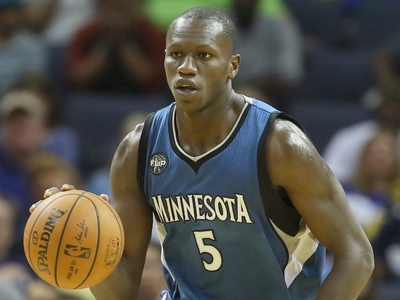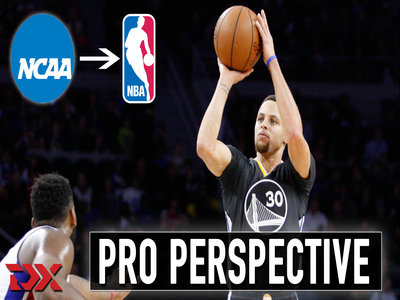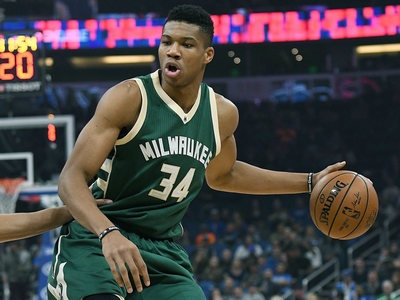More From Sports Aptitude
-NBA Market Watch: Situated For Success Part One
-NBA Market Watch: DeAndre Bembry
-Opportunity Knocks: Personality Factors Top To Bottom
-NBA Market Watch: Will Barton
-Opportunity Knocks: What's Trending in Development
-Opportunity Knocks: Fitting In vs Fitting Out
-Opportunity Knocks: The Pluses and Minuses of Success
-The DeAndre Jordan Rules
-DeMarre Carroll's Long and Winding Road to Stardom
-The Unbearable Lightness of Patrick Beverley
-Everybody Loves Draymond Green
-Jimmy Butler's Rise to Stardom
-How Situation Impacts Success, Part Two
-How Situation Impacts Success, Part One
-The Thin Line Between Busts and Steals
Player Type is defined by the general trends in personality a player shares with others. Additionally, three player-specific traits are listed for each player to highlight a unique combination of attributes that differentiate him from others. The Projected Situation factors below are defined in order to quantify specific Environment, Opportunity, and Workload criteria.
These variables are then used to analyze how different Player Types have historically performed under different developmental circumstances. This allows us to use the wealth of available NBA player data (spanning over a decade, and now consisting of most of the league) to measure significant differences in on-court performance and form better hypotheses regarding the cause-and-effect nature that personality and situation has on development.
By identifying these historical trends we can:
- Form more accurate player comparisons
- Create more context for past performance
- Better assess player-to-team fit
- Adjust developmental support tactics faster
We'll break down each player through the lens of the key factors and apply them to what we know about potential team needs to project who is poised for a breakout season. These are brief snapshots, rather than a deep-dive into the data, meant to highlight Players of Interest going into the season. These Cliffs notes versions are only a fraction of the picture, but should give readers something to ponder on each player as their stories unfold.
GORGUI DIENG
PERSONALITY FACTORS
Player Type: Composed
Responsible: 36% Above NBA Norms
Conservative: 22% Above NBA Norms
Confident: 22% Above NBA Norms
SITUATION FACTORS
Experiential Status: RSCI Top 50 Recruit
Projected Environment: Under .400 Team WL%
Projected Opportunity: 20-29 MPG
Projected Workload: Under 18 USG%
Dieng quietly put together a strong Year three performance as a supporting actor to Minnesota's rendition of Kat's. Dieng's development over the past three seasons is a tribute to his professionalism. The high value he places on responsibility likely played a key role in his ability to progress while the organizational direction was still unclear. Those confident/conservative qualities instill a resilience in Dieng that help to block out noise. But those same qualities also can make small changes take longer to internalize as well.
The coaching staff will have to be invested in Dieng's growth potential in order to capitalize on the benefits of the team's newfound stability. Dieng is in a good position to take another developmental leap forward. His profile alludes to a strong potential for chemistry with Karl-Anthony Towns from a personality standpoint. Building that relationship as part of the foundation of the team's defensive culture should tickle Dieng's strongest qualities and lock him into reaching the benchmarks set before him. Coach Thibodeau's affinity for gritty defenders also strengthens this tandem's potential. Both players possess the length to defend the interior, while still having the mobility to switch on the perimeter.
Dieng's touch from the free throw line (83%) and degree-of-difficulty finishes in the post also show his potential to join KAT as a three-point threat, but his technique needs some polishing up - particularly when operating on the perimeter. There is still plenty of room for growth here. Players with Dieng's traits typically take longer to internalize changes to familiar habits. Couple those traits with three seasons of transition, and you have a confluence of factors that can impede his rate of development. The order of organizational priorities may favor more individual attention to Towns, Wiggins, and Dunn; but there is a high R.O.I. to be garnered from investing in Dieng as well.
Player Type: Composed
Responsible: 36% Above NBA Norms
Conservative: 22% Above NBA Norms
Confident: 22% Above NBA Norms
SITUATION FACTORS
Experiential Status: RSCI Top 50 Recruit
Projected Environment: Under .400 Team WL%
Projected Opportunity: 20-29 MPG
Projected Workload: Under 18 USG%
Dieng quietly put together a strong Year three performance as a supporting actor to Minnesota's rendition of Kat's. Dieng's development over the past three seasons is a tribute to his professionalism. The high value he places on responsibility likely played a key role in his ability to progress while the organizational direction was still unclear. Those confident/conservative qualities instill a resilience in Dieng that help to block out noise. But those same qualities also can make small changes take longer to internalize as well.
The coaching staff will have to be invested in Dieng's growth potential in order to capitalize on the benefits of the team's newfound stability. Dieng is in a good position to take another developmental leap forward. His profile alludes to a strong potential for chemistry with Karl-Anthony Towns from a personality standpoint. Building that relationship as part of the foundation of the team's defensive culture should tickle Dieng's strongest qualities and lock him into reaching the benchmarks set before him. Coach Thibodeau's affinity for gritty defenders also strengthens this tandem's potential. Both players possess the length to defend the interior, while still having the mobility to switch on the perimeter.
Dieng's touch from the free throw line (83%) and degree-of-difficulty finishes in the post also show his potential to join KAT as a three-point threat, but his technique needs some polishing up - particularly when operating on the perimeter. There is still plenty of room for growth here. Players with Dieng's traits typically take longer to internalize changes to familiar habits. Couple those traits with three seasons of transition, and you have a confluence of factors that can impede his rate of development. The order of organizational priorities may favor more individual attention to Towns, Wiggins, and Dunn; but there is a high R.O.I. to be garnered from investing in Dieng as well.
TAUREAN PRINCE
PERSONALITY FACTORS
Player Type: Collaborative
Goal-Oriented: 27% Above NBA Norms
Serious: 24% Above NBA Norms
Confident: 22% Above NBA Norms
SITUATION FACTORS
Experiential Status: Over 100 RSCI Recruit
Projected Environment: .400 to .600 Team WL%
Projected Opportunity: Under 20 MPG
Projected Workload: Under 18 USG%
Prince was drafted in the lottery by a playoff team, which is an a-typical scenario for our projection model. Player's with Prince's key traits typically enjoy a great deal of success when allowed to slot into a projectable role, work within a system, and move themselves up the food chain. Prince's elevated serious-minded approach to opportunity and goal-focus gives him value beyond his four years of collegiate experience. The attack mentality that earned him a lotto-nod from the Hawks may have left Prince a bit out of control at times on-court at Baylor. But, his sense of perspective should serve him well as he refines his decision-making within the context of the standards of the team.
If Atlanta continues to hum along at the level of system efficiency they've enjoyed recently, Prince should quickly find ways to positively make an impact. Much as Justise Winslow in Miami, Prince is looking at a Year one season where he'll be surrounded by a number of established veterans with a more definitive hierarchy to work within than most lottery picks. As the twelfth pick, Prince may be given the chance at unseating Mike Scott - and his expiring contract - as he has the demeanor to do so. But, Atlanta's frontcourt depth was bolstered by the team's investment in Dwight Howard, making the competition for minutes fierce.
Consistency from the perimeter will likely be an important factor in this roster coming together this season. Prince's ability to be solid on both sides of the ball could give him a leg up on minutes in a switch/swing combo with Kent Bazemore if Korver continues to show signs of aging. But, he'll have to adjust to NBA three-point range first. However, it would not be surprising to see Prince in the starting lineup at some point this season. His size and versatility on the defensive end provide some intriguing matchup options and his personality is ideally suited to increasing his output the more opportunity he sees.
Player Type: Collaborative
Goal-Oriented: 27% Above NBA Norms
Serious: 24% Above NBA Norms
Confident: 22% Above NBA Norms
SITUATION FACTORS
Experiential Status: Over 100 RSCI Recruit
Projected Environment: .400 to .600 Team WL%
Projected Opportunity: Under 20 MPG
Projected Workload: Under 18 USG%
Prince was drafted in the lottery by a playoff team, which is an a-typical scenario for our projection model. Player's with Prince's key traits typically enjoy a great deal of success when allowed to slot into a projectable role, work within a system, and move themselves up the food chain. Prince's elevated serious-minded approach to opportunity and goal-focus gives him value beyond his four years of collegiate experience. The attack mentality that earned him a lotto-nod from the Hawks may have left Prince a bit out of control at times on-court at Baylor. But, his sense of perspective should serve him well as he refines his decision-making within the context of the standards of the team.
If Atlanta continues to hum along at the level of system efficiency they've enjoyed recently, Prince should quickly find ways to positively make an impact. Much as Justise Winslow in Miami, Prince is looking at a Year one season where he'll be surrounded by a number of established veterans with a more definitive hierarchy to work within than most lottery picks. As the twelfth pick, Prince may be given the chance at unseating Mike Scott - and his expiring contract - as he has the demeanor to do so. But, Atlanta's frontcourt depth was bolstered by the team's investment in Dwight Howard, making the competition for minutes fierce.
Consistency from the perimeter will likely be an important factor in this roster coming together this season. Prince's ability to be solid on both sides of the ball could give him a leg up on minutes in a switch/swing combo with Kent Bazemore if Korver continues to show signs of aging. But, he'll have to adjust to NBA three-point range first. However, it would not be surprising to see Prince in the starting lineup at some point this season. His size and versatility on the defensive end provide some intriguing matchup options and his personality is ideally suited to increasing his output the more opportunity he sees.
RONDAE HOLLIS-JEFFERSON
PERSONALITY FACTORS
Player Type: Collaborative
Risk-Taking: 39% Above NBA Norms
Sympathetic: 37% Above NBA Norms
Open-Minded: 32% Above NBA Norms
SITUATION FACTORS
Experiential Status: RSCI Top 50 Recruit
Projected Environment: Under .400 Team WL%
Projected Opportunity: Over 30 MPG
Projected Workload: 18 to 22 USG%
Hollis-Jefferson's measurable and observable traits are tailor-made for this season's Brooklyn Nets. His extreme comfort taking risks is exhibited time and again by his style of play - always teetering on the edge of control, while finding ways to make a positive impact. His ability to earn such leeway in the past most certainly comes from a genuine desire to connect with people. Hollis-Jefferson is both sympathetic to others as well as having the ultimate level of flexibility when it comes to trying new things. His ability to win friends and influence people creates internal champions for his success.
From a situation standpoint, all the factors appear to align for RHJ to carve out a major role for himself this year. Brooklyn is in the fledgling stages of a major transition period with a veritable open audition for players within its homogeneous mix of talent to stand out. It's often difficult for players to sustain a proactive approach in the face of adversity. But, Brooklyn has brought in a ton of players whose personalities and points in their careers lend themselves well to a play hard team dynamic - Trevor Booker, Greivis Vasquez and Jeremy Lin bring a measurable presence to the locker room. Justin Hamilton is a player who could surprise if/when Brook Lopez moves on to greener pastures.
Each of them comes into this year with varying levels of expectations in terms of on-court performance. For Hollis-Jefferson, having the status of a key developmental prospect, while being surrounded by people who are responsive to his style, is massively beneficial. Without the win-now pressure to maximize efficiency, Hollis-Jefferson should have the bandwidth necessary to push the boundaries of his game while garnering the support of his teammates. It may not always be pretty, but Jefferson's production should establish a new tier for his potential that wouldn't have been expedited in a more restrictive environment.
Player Type: Collaborative
Risk-Taking: 39% Above NBA Norms
Sympathetic: 37% Above NBA Norms
Open-Minded: 32% Above NBA Norms
SITUATION FACTORS
Experiential Status: RSCI Top 50 Recruit
Projected Environment: Under .400 Team WL%
Projected Opportunity: Over 30 MPG
Projected Workload: 18 to 22 USG%
Hollis-Jefferson's measurable and observable traits are tailor-made for this season's Brooklyn Nets. His extreme comfort taking risks is exhibited time and again by his style of play - always teetering on the edge of control, while finding ways to make a positive impact. His ability to earn such leeway in the past most certainly comes from a genuine desire to connect with people. Hollis-Jefferson is both sympathetic to others as well as having the ultimate level of flexibility when it comes to trying new things. His ability to win friends and influence people creates internal champions for his success.
From a situation standpoint, all the factors appear to align for RHJ to carve out a major role for himself this year. Brooklyn is in the fledgling stages of a major transition period with a veritable open audition for players within its homogeneous mix of talent to stand out. It's often difficult for players to sustain a proactive approach in the face of adversity. But, Brooklyn has brought in a ton of players whose personalities and points in their careers lend themselves well to a play hard team dynamic - Trevor Booker, Greivis Vasquez and Jeremy Lin bring a measurable presence to the locker room. Justin Hamilton is a player who could surprise if/when Brook Lopez moves on to greener pastures.
Each of them comes into this year with varying levels of expectations in terms of on-court performance. For Hollis-Jefferson, having the status of a key developmental prospect, while being surrounded by people who are responsive to his style, is massively beneficial. Without the win-now pressure to maximize efficiency, Hollis-Jefferson should have the bandwidth necessary to push the boundaries of his game while garnering the support of his teammates. It may not always be pretty, but Jefferson's production should establish a new tier for his potential that wouldn't have been expedited in a more restrictive environment.
JUSTIN ANDERSON
PERSONALITY FACTORS
Player Type: Composed
Group-Oriented: 48% Above NBA Norms
Expressive: 47% Above NBA Norms
Experimental: 44% Above NBA Norms
SITUATION FACTORS
Experiential Status: RSCI Top 50 Recruit
Projected Environment: Under .400 Team WL%
Projected Opportunity: Over 30 MPG
Projected Workload: 18 to 22 USG%
These two quotes from a recent Star-Telegram interview capture the essence of Justin Anderson well:
[Year one preseason] I wanted to try so hard to show what I was capable of and trying to impress. Then when explaining his year two summer league experience, [Year two summer league] I was able to communicate in a positive way, but also be pretty stern on what our expectations were as an organization
Anderson is fiercely motivated by a desire to not only gain influence, but respect within his peer group; measuring exceptionally high in social-orientation relative to league norms. Notice the use of the word stern in that second statement as well. Anderson is a natural leader in many ways - fearless, aggressive, accountable - but, had to adjust that all out attitude to the notion that he was no longer at the top of the food chain.
Dallas' combination of accomplished veterans and viable role opportunity for its youth provided a great forum for Anderson. He was eventually able to lower the RPMs to a level where he could earn that prove myself shot by aligning his intensity with the proper avenues to apply it to. Having established that important foundation, Anderson is now in a position to build off of it. There is an intriguing mix of younger talent with a wealth of offensive role-responsibility up for grabs, which presents chances to climb the ladder.
Player Type: Composed
Group-Oriented: 48% Above NBA Norms
Expressive: 47% Above NBA Norms
Experimental: 44% Above NBA Norms
SITUATION FACTORS
Experiential Status: RSCI Top 50 Recruit
Projected Environment: Under .400 Team WL%
Projected Opportunity: Over 30 MPG
Projected Workload: 18 to 22 USG%
These two quotes from a recent Star-Telegram interview capture the essence of Justin Anderson well:
[Year one preseason] I wanted to try so hard to show what I was capable of and trying to impress. Then when explaining his year two summer league experience, [Year two summer league] I was able to communicate in a positive way, but also be pretty stern on what our expectations were as an organization
Anderson is fiercely motivated by a desire to not only gain influence, but respect within his peer group; measuring exceptionally high in social-orientation relative to league norms. Notice the use of the word stern in that second statement as well. Anderson is a natural leader in many ways - fearless, aggressive, accountable - but, had to adjust that all out attitude to the notion that he was no longer at the top of the food chain.
Dallas' combination of accomplished veterans and viable role opportunity for its youth provided a great forum for Anderson. He was eventually able to lower the RPMs to a level where he could earn that prove myself shot by aligning his intensity with the proper avenues to apply it to. Having established that important foundation, Anderson is now in a position to build off of it. There is an intriguing mix of younger talent with a wealth of offensive role-responsibility up for grabs, which presents chances to climb the ladder.
PATRICK MCCAW
PERSONALITY FACTORS
Player Type: Collaborative
Grounded: 34% Above NBA Norms
Empathetic: 30% Above NBA Norms
Attentive: 25% Above NBA Norms
SITUATION FACTORS
Experiential Status: RSCI Over 100 Recruit
Projected Environment: Over .600 Team WL%
Projected Opportunity: Under 20 MPG
Projected Workload: Under 18 USG%
When Jerry West confidently stated, people are going to be sorry they didn't draft [McCaw] it's easy to speculate that he was referencing more than just McCaw's physical skills. McCaw is an exceptionally perceptive person, let alone for an NBA neophyte just shy of his twenty-first birthday. By the numbers, McCaw puts a tremendous amount of value in building relationships - something that comes across strongly when he speaks. But this down-stated humility hides his competitive qualities - all of which are significantly above NBA norms.
His humble high school beginnings, (RSCI rank of 222) was followed by two years of lawless ball with the Runnin' Rebels. The lack of early acclaim book-ended by the lack of continuity in his collegiate environment undoubtedly hindered, not only his on-court ability, but his emotional tenure as well. The combination of these factors may have skewed the perception of scouts, but should serve him well with the Warriors. McCaw's sensitivity to chemistry is a pendulum that should be on the upswing in a culture that preaches Joy, Mindfulness, Compassion, and Competition - concepts that fit McCaw's core qualities.
McCaw's rate of growth should be far more rapid than most. The Warriors are uber-loaded to the point where they are likely to be resting players with even more frequency than last year. The support he should garner from enthusiastic teammates looking to develop depth - and more regular season rest - will be a boon cleaning up McCaw's rough edges quickly. McCaw needs low leverage, real game reps and quality critiques to tighten up his reads in the team defense, as well as continue to refine his shot set-up from the perimeter. But, the foundation is there with a near-perfect personality/situation mix for a surprise Year One season.
Player Type: Collaborative
Grounded: 34% Above NBA Norms
Empathetic: 30% Above NBA Norms
Attentive: 25% Above NBA Norms
SITUATION FACTORS
Experiential Status: RSCI Over 100 Recruit
Projected Environment: Over .600 Team WL%
Projected Opportunity: Under 20 MPG
Projected Workload: Under 18 USG%
When Jerry West confidently stated, people are going to be sorry they didn't draft [McCaw] it's easy to speculate that he was referencing more than just McCaw's physical skills. McCaw is an exceptionally perceptive person, let alone for an NBA neophyte just shy of his twenty-first birthday. By the numbers, McCaw puts a tremendous amount of value in building relationships - something that comes across strongly when he speaks. But this down-stated humility hides his competitive qualities - all of which are significantly above NBA norms.
His humble high school beginnings, (RSCI rank of 222) was followed by two years of lawless ball with the Runnin' Rebels. The lack of early acclaim book-ended by the lack of continuity in his collegiate environment undoubtedly hindered, not only his on-court ability, but his emotional tenure as well. The combination of these factors may have skewed the perception of scouts, but should serve him well with the Warriors. McCaw's sensitivity to chemistry is a pendulum that should be on the upswing in a culture that preaches Joy, Mindfulness, Compassion, and Competition - concepts that fit McCaw's core qualities.
McCaw's rate of growth should be far more rapid than most. The Warriors are uber-loaded to the point where they are likely to be resting players with even more frequency than last year. The support he should garner from enthusiastic teammates looking to develop depth - and more regular season rest - will be a boon cleaning up McCaw's rough edges quickly. McCaw needs low leverage, real game reps and quality critiques to tighten up his reads in the team defense, as well as continue to refine his shot set-up from the perimeter. But, the foundation is there with a near-perfect personality/situation mix for a surprise Year One season.

























Comments